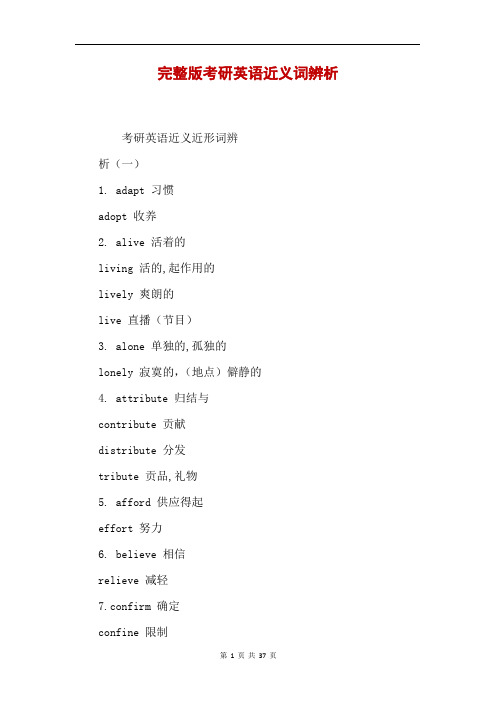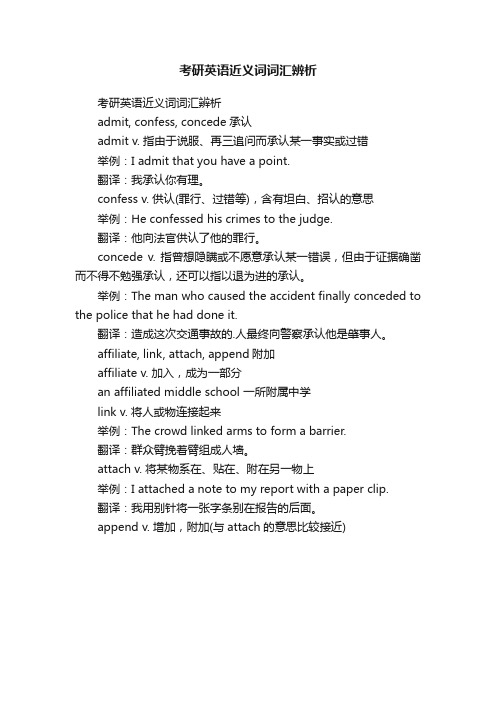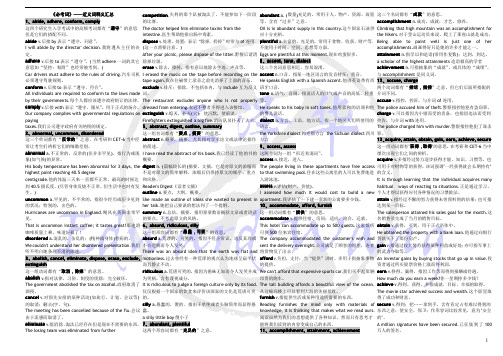考研英语近义词辨析
完整版考研英语近义词辨析

完整版考研英语近义词辨析考研英语近义近形词辨析(一)1. adapt 习惯adopt 收养2. alive 活着的living 活的,起作用的lively 爽朗的live 直播(节目)3. alone 单独的,孤独的lonely 寂寞的,(地点)僻静的4. attribute 归结与contribute 贡献distribute 分发tribute 贡品,礼物5. afford 供应得起effort 努力6. believe 相信relieve 减轻7.confirm 确定confine 限制confess 承认confuse 使糊涂refuse 拒绝8. commit 犯(错误)submit 递交permit 允许admit 承认omit 省略9. cure 治愈curve 使弯曲curse 诅咒10. considerate 思考周到的 considerable 相当多的considering 思考到,顾及11. clear 清晰的clean 清洁的12. definite 明确的infinite 无限的define 定义13. different 别同的indifferent 无关紧要的14. disappoint 使失望disapprove 别赞成15. deceive 欺骗receive 收到16. expensive 昂贵的experiment 实验17. ensure 保证assure 担保insure 给…保险18. expensive 昂贵的expansive 易扩张的extensive 广大的intensive 强烈的19. expense 费用expansion 膨胀extension 扩充exposure 暴露 20. efficient 有效的sufficient 充分的effective 有效的21. harvest 收获harness 马具22. high 高的highly 很23. imply 暗示apply 应用supply 提供reply 答复24. impose 强加expose 揭露propose 打算suppose 假设25. inspect 检查expect 期待respect 恭敬suspect 怀疑26. include 包含conclude 结束27. infect 传染effect 结果affect 妨碍28.inquire 询咨询require 需要acquire 获得29.interfere 干涉interrupt 打搅interpret 解释interview 接见rm 通知reform 改革perform 履行31.jam 果酱jar 广口瓶jaw 下巴32.lie 讲谎lay 放置33.note 注意notice 通知34.obtain 获得maintain 维持contain 包含sustain 支持35.object 物体subject 主题project 工程36.price 价格prize 奖品praise 称赞37.present 礼物represent 象征38.possess 拥有process 过程39.prefer 更喜爱refer 谈及infer 判断40.project 工程reject 拒绝41.pretext 借口protect 爱护protest 抗议42.produce 生产reduce 减少deduce 推论induce 劝诱43.preserve 爱护reserve 储存conserve 保存44.review 复习 revise 修改preview 事先查看45.resist 反抗persist 持续insist 坚持assist 帮助consist 由…组成46.resume 履历consume 消耗assume 假定47.respond 回答correspond 符合48.respective 分不的respectful 恭敬的respectable 可敬的49.rise 上升arise 浮现raise 提高arouse 唤醒50.status 身份statue 雕像51.staff 全体员工stiff 僵硬的stuff 原料52.sensible 有感受的sensitive 敏感的53.succeed 成功proceed 举行exceed 超越54.transmit 传输transfer 转移transform 转换translate 翻译transport 运输transplant 移植55.temporary 临时contemporary 并且代的56.unite 联合unity 团结reunion 重聚unit 个体57.vary 变化varied 各式各样的various 别同的variety 种类variable 可变的58.wander 闲逛wonder 对…感到惊讶59.recommend 推举demand 要求command 命令60.access 接近excess 过量61.adverse 敌对averse 反对的62.affectation假装affection爱63.allusion 暗示illusion幻觉64.annual 一年一次的annul取消65.appraise估价apprise报告66.argument 争论augment 增加67.bandage绷带bondage奴役68.carton用纸盒包装cartoon漫画69.censor检查censure责难70.collision猛烈相撞collusion共谋71.confidant 密友confident肯定的72.consul 领事council会议counsel劝说73.dairy乳牛场diary日记74.decease死亡disease疾病75.decent适合desent落下dissent异议76.desert 沙漠dessert甜点77.disassemble分解dissemble伪装78.drought,draft草稿drought 久旱79.eligible 合格的illegible难读的80.eminent著名的imminent迫近的81.exalt提升exult欢腾82.ingenious设计精致的ingenuous天确实83.jealous妒忌的zealous热心的84.material材料materiel军备85.moral 品格端正的morale士气86.ordinance法令ordnance军械87.parish教区perish死88.perpetrate犯(罪)perpetuate使别朽88.personality人格personalty私人财产89.persecute迫害prosecute举行90.portable可携带的potable可饮用的91.prescribe开药方proscribe禁止92.reality真实realty别动产93.statue雕像stature身材94.vacation假期vocation职业95.alumna女毕业生alumnus男毕业生alumni毕业生96.amoral 非道德的immoral别道德的uXXXoral无关道德咨询题的97.avocation嗜好vocation职业vacation 假期98.biannual一年两度的biennial两年一次的99.chord琴弦cord细绳100.clench主要牙关clinch是订牢111.climate气候weather天气pare 比较contrast对照113.connotation涵义denotation意义114.contemptible可鄙的contemptuous轻视的115.continual延续的continuous别断的116.credible 可信的credulous轻信的117.disinterested公正的uninterested别赶兴趣的118.disorganized杂乱无章的unorganized未加组织的119.divers种种的diverse别同的120.dual 二重的duel决斗121.egoist利己主义者egotist自大者122.merge 浮现immerge浸入123.emigrant 自本国移居他国者immigrant自他国移入者124.father更远的further更进一步的125.hanged绞死hung悬挂126.historic历史上闻名的historical有关历史的127.human 人类的humane慈善的128.imaginary虚构的imaginative富于想象的129.incomparable举世无双的 uncomparable无法比较的130.incredible 难以置信的 incredulous别信的131.apt易于liable易患的likely有也许的132.luxuriant繁茂的luxurious奢靡的133.moan呻吟mourn哀悼134.oral口头的verbal言辞的135.personal私人的personnel人员136.register登记registrars登记员137.sailer帆船sailor水手138.salon客厅saloon酒店139.subcoucious潜意识的unconscious失去知觉的140.transcript副本transcription眷写141.altar神坛alter改变142.ascent上升assent接受143.cannon大炮canon教规144.canvas帆布canvass兜售145.cession割让session开会146.faint 昏厥feint作假击147.intension激烈intention意图148.pray祈祷prey被捕食之物149.principal 首要的principle基本信条150.stationary固定的 stationery文具151.address地址,发表演讲attribute性质mittee委员会concert音乐会content内容153.converse N 相反的事物V 谈话154.desert N 沙漠V 舍弃 155.digest N 摘要V 消化156.instinct N 本能 A 充满的157.intimate A 亲热的V 暗示158.minute N 分 A 弱小的159.object N 物体V 反对160.refuse V 拒绝N 垃圾161.tear N 泪V 撕ed A 用旧了的 A 适应于163.aboard adv/prep.在船或飞机上,abroad adv. 向国外;在国外,164.academic a.学术的,学者的academical a..学院的,大专院校的165.accept v.同意.except prep./v.除外167.acceptance n.同意acceptation n.字句的意义168.adhesive a.胶粘的cohesive a.密切结合在一起的169.admission n.入场;入学,入会admittance n.入场170.adverse a. 相反的,别利的averse a. 反对的;别乐意的171.affectation n.妨碍;爱情affection n.矫揉造作affect v.妨碍effect v./n.产生结果;结果172. allusion n.暗示,隐喻illusion n.幻觉,错觉173.alternate a.轮流的,交替的,间隔的alternative a./n.二中择一的174.amend v.修正议案等emend v.校勘,校订175.amiable a.人和气可亲的am cable a.行为手势友好的176.ascend v.上升;攀登;追溯descend v.下落;代代传下来177.assent n./v. 接受,赞许 ascent n. 上升;登高178.attempt n./v.试图,努力tempt v.诱惑179.blush v.因害羞或狼狈而引起的脸红flush v.因兴奋紧张欢跃而引起的脸红180.break n./v.歇息;打破brake n. 刹车181.burnish v. 抛光;打磨furnish v. 供给182.bury v.埋葬berry n.浆果183.capital a./n.首要的;首都capitol n. 美国国会大厦184.cellar n. 地下室(贮藏粮食燃料)seller n. 卖主;售货之物185.childish a. 小孩所特有的,稚嫩的childlike a. 小孩们天确实,老实的pliment v,/n. 向…致意,祝贺;表扬,赞叹的话complement v./n. 补充;补充物prehensible a.能知道的,能够明白的comprehensive a.综合的,全面的188.congenial a. 义气相投的,合适的congenital a.天生的189.considerable a.相当的considerate a.体贴的190.corps n.特种兵团,军团corpse n. 尸体191.course n.课程;路线coarse a. 粗糙的,粗俗的192.credible a.可信的,可靠的credulous a. 轻信的,易受骗的193.defective a.有缺点的有毛病的deficient a. 缺乏的,别脚的194.detection n.查明,查出detention n. 扣留,扣押195.disinterested a.无私的,无偏见的uninterested a.别感兴趣的;漠别关怀的196.dissent n./v. 持异议别接受descent n. 落下,下坡,家世197.distinct a.明显的;性质上别同的distinctive a. 区不的;鉴不性的;有特XXX的198.eatable a.新奇的,可口的edible a. 可食的199.electric a. 用电的electrical a.与电有关的200.eminent a.杰出的imminent a.迫切的,逼近眼前的201.expand v.扩大膨胀,进展 expend v. 花费202.extinguish v.熄灭(火光、希翼等)distinguish v. 区不 203.faint a.虚心的,怯懦的,微弱的feint n./v.佯攻假装 204.flame n./v.光辉,火焰;燃烧,变红blame v.谴责,归咎于205.flash n./v.闪光,闪耀flush n./v.脸群红润;面孔忽然发红206.heal v.愈合heel n.足后跟207.historic a.有历史意义的historical a. 历史的,有关历史的208.hoarse a.声音发哑的 coarse a.粗糙的,粗鲁的209.ignoble a.卑鄙的,出身卑贱的ignorant a. 无知的210.imaginative a. 富有想象力的imaginary a. 假想的imaginable a.能够想象得到的211.legislative a.立法的,立法权的legitimate a. 合法的,,正当的,合理的212.literal a.字面的literary a. 书面的文学的213.minor a./n小的;未成年者miner n.矿工214.negligible a.可忽略的,微别脚道的neglectful a.别留心的疏忽的215.practicable a.可行的,行得通的practical a. 实用的,现实的216.principal a./n.要紧的;校长principle n. 主义,原则217.reserve v.保留(意见、权力、款项);预定(房间、座位) preserve v. 收藏保存防腐conserve v. 保持,保存218.respectable a. 可恭敬的respectful a.尊敬的219.responsible a.负责的responsive a. 回答的,响应的220.seasonal a. 季节性的seasonable a.当令的,合时的,及时的221.sensible a. 觉察的,明智的sensitive a. 敏感的神通过敏的222.sensual a.肉体上的,XXX 的,XXX的sensuous a. 感受上的,感官享受的,引起美感的223.shameful a.可耻的ashamed a. 认为…是羞耻224.sore a.痛的,酸痛的sour a. 酸的225.suit n. 一套衣服,诉讼suite n. 房间器具的一套225.unable a.别可以,不可能disable a. 使残废,使XXX226.zealous a. 热心的,热诚的jealous a. 妒忌的227..relieve减轻,解除,援助reveal 透露,暴露release 释放reject 拒绝,抛弃resolve 决心,决定,决议revenge 报复,复仇revenue 税收refuge 庇护,避难所revolt 造反,抵抗228..contend vi.竞争,竞赛,争论vt.主张,坚信content 内容contest 竞赛,比赛context 上下文contrast 对比,对照continents 大陆,大洲constituents 构成constructs 建筑,构造constitutes 构成229.acclaim 向……欢呼,为……喝彩proclaim 宣告,声明 exclaim 呼喊reclaim 要求归还,收回declaim 高声朗读230..acid 酸,酸的acrid 辛辣的arid,干旱的avid 渴望的avoid 幸免231.abrupt 忽然的corrupt XXX的disrupt 分裂,瓦解erupt 爆发232.deduce 演绎seduce 诱使educe 引出,得出induce 劝诱reduce 减少,缩小233.detail 琐事,详情 retail 零售entail 使承担234.evoke 唤醒invoke 调用provoke 激怒revoke 撤回235.expel 驱赶repel 反击impel 推动dispel 驱散compel 强迫236.mission 使命,任务,代表团admission,允许进入 commission 委任emission 发射,散发permission 许可transmission 播送,发射missionary 传教士237.bubble 泡,泡沫pebble 卵石rubble 瓦砾,碎石238.reject 拒绝,对齐,排斥eject 逐出inject 注射deject 使沮丧239.press 压suppress 镇压,抑制impress 印,留下印象depress 使消沉compress 压缩express 表达pressure 压力,压强,强制,压迫240.resource 资源,财力 recourse 求助,求援241.pose 造成(困难等);提出(咨询题等);陈述(观点等) compose 组成,写作dispose 处理,处置expose 使暴露impose 征税,强加oppose 反对purpose 计划suppose 推想,假设propose 提议,建议,提名,推举242. product 产品,强调由人力或机械力或自然力生产的东西production 生产produce 产物,农产品productivity 生产力243. success 成功succession 延续244. expansion 扩张,膨胀excursion 短途旅行existence 存在exchange 交换,交流245. recession 萧条,衰退concession 让步confession 招供,认错confusion 混乱,紊乱246. symptoms 症状,征兆syndrome 综合症状247. overhaul 完全检查overflow 飞过overlap 部分重叠overcast 遮蔽248. process 过程,步骤,程序prospects 指经济方面的前景project 规则,方案,工程profile 侧影,外形249. praise 赞叹braise 炖肉250. self-confident 自信的self-sufficient 自给自脚的self-satisfied 自满的self-restrained 自XXX纵的251. assumption 假定,假设,多指无证据的设想;presumption 认定,猜测,侧重有依照的推论252. consumption 消费resumption 回复253. attain达到,获得,尤指通过一定的努力而获得obtain,获得abstain 放弃retain 保留contain 包含254. distort 斜曲,曲解contort 因扭曲而变形retort 反驳255. concede 承认,让步accede 接受recede 后退precede 率先256. barely 强调程度rarely 强调频率257. worth be ~ sth/doing值得worthy be ~ of够得上,值得worthless 无价值的worthwhile 值得花时刻的,值得做的258. distinguishing 分辨discovering 发觉determining 真的detecting 察觉259. diluted 冲淡,稀释dissolved 解散,溶解dispersed 分散,散布diffused 散开,扩散260. interaction (with)与……的互相作用,互相妨碍 assimilation (into)习惯,同化,融入……cooperation (with)与……的合作consultation (with)和……的商量261. now that 既然(表条件)so that 以使,以至(表目的)262. even if 及时,表让步 if only 但愿,希翼,标示一种强烈的愿望,后接虚拟语气 only if 惟独在……的时候,表示对条件的强调as if 好似,宛然,表比较263. origin 起源original 原创264. identical 同一的,同样的duplicate 复制的265. protest 抗议,反对(反对的内容差不多实施)object 反对(反对的内容未曾实施)266. advise 给对方建议劝说对方,但对方是否同意别抱希翼(弱势对强势);suggest 建议希翼对方做某事,往往带有敦促、鼓舞或警告之意(强势对弱势)propose 提议,供大伙儿讨论267. sick of 对…厌恶(尤指因食、饮、听、看过度引起的) tire of 厌倦,对…别感兴趣268. bind 有约束力的restrain 抑制的,遏制的,可指彻底阻挠也可指将……纳入操纵、约束之中,强迫意味,可表示自我抑制vtlimit (能力或数量上)有限的confine (空间上)受限的269. grant (由于大方、仁慈)赋予某物,(通常是上对下、官方正式地)允许allow (普通意义上)允许permit (法律上、制度上)允许270. fare (特指交通等)费用 fee (进入一具地点,如场馆、学校等)费用bill (用餐、电话等)账单考研英语近义近形词辨析(二)1.climate:气候,风气,思潮circumstance:特指经济状况,表示环境,状况时常用复数atmosphere:气氛,氛围enviroXXXent:指对人的感情、品德、思想等或动植物生存产生妨碍的环境surroundings:特指自然环境(地理概念)context:上下文2.vessel:血管,管道,普通指细小管道;route:路线,航线;path:乡间小路,公园小径;channel:海峡,渠道,管道;road:广大平整的大道,多指公路;way:可指各种路、道或通道,也可指抽象的道路、办法;street: 尤指都市中的道路;highway: 通常指市区外能够通行各种机动车辆的交通干线; motorway(free way,express way): 高速公路;lane: 指农村或城镇的小道或小径,也指小巷;pavement(sidewalk):街道两旁的人行道;trail: 指人或兽在森林、荒野或山中踩出的小径或崎岖小道3. in place of指以甲到乙;instead of除代替外有对乙否定的意味,有时译为别4. as to:对于;for instance:后接一具句子或作插入语,放在句子中偶尔末尾,后面别能直截了当接宾语;such as:列举同类人或事物中的几个例子,用在句子中间,后面是suchas之前内容的一具方面或补充;in particular:特殊的,尤其,详尽的for example:举例讲明某一论点或事情,普通只举同类人或物中的“一具”为例,可位于句首、句中或句末5. tighten:加紧,收紧,侧重强调数量,活动,情感,别和control搭配;intensify:加强,强化;fasten:系牢,扣紧,多接具体名词6. rough:指某物表面凹凸别平,别光滑;coarse: 指某物质地粗糙低劣或编织、加工等别精细、精致。
考研英语常用同义词辨析必读

最新考研英语常用同义词辨析必读Aabandon, desert, forsake, leave, give up这些动词或词组均含“抛弃、放弃”之意abandon :强调永远或完全放弃或抛弃人或事物等,这可能是被迫的,也可能是自愿的。
desert :着重指违背法律责任和义务,或自己的信仰与誓言的行为,多含非难的意味。
forsake :侧重断绝感情上的依恋,自愿抛弃所喜欢的人或物。
也指抛弃信仰或改掉恶习。
leave :普通用词,指舍弃某事或某一职业,或终止同一某人的关系,但不涉及动机与果。
give up :普通用语,侧重指没有希望或因外界压力而放弃。
ability, capacity, capability, genius, talent, competence, faculty, gift, aptitude这些名词均可表示人的“能力,才能”之意。
ability :普通用词,指人先天的或学来的各种能力。
capacity :侧重指人的潜在能力,通常不指体力,多指才智,尤指接受与领悟能力。
capability :多用于人,指胜任某项具体工作的能力,也指本身具有、尚未发挥的潜在能力。
常与of或for连用。
genius :语气最强,指天赋的高度才能与智力。
talent :着重指人某方面具有可发展和倍养的突出天赋才能,但语意比genius 弱。
competence :正式用词,侧重指令人满意的业务能力与水平,达到胜任某项工作等的要求。
faculty :指特殊的才能或智力。
gift :着重个人的天赋的才能或在某方面的显着本领,常暗含不能用一般规律作解释的意味。
aptitude :多指先天或后天习得的运用自如的能力,常暗示接受能力强,能迅速掌握一种学术训练或艺术技巧。
able, capable, competent这些形容词均含有“有能力的,能干的”之意able :最常用词,多用于褒义,着重指多方面的,经常性的,或潜在性的能力。
考研英语近义词词汇辨析

考研英语近义词词汇辨析
考研英语近义词词汇辨析
admit, confess, concede承认
admit v. 指由于说服、再三追问而承认某一事实或过错
举例:I admit that you have a point.
翻译:我承认你有理。
confess v. 供认(罪行、过错等),含有坦白、招认的意思
举例:He confessed his crimes to the judge.
翻译:他向法官供认了他的罪行。
concede v. 指曾想隐瞒或不愿意承认某一错误,但由于证据确凿而不得不勉强承认,还可以指以退为进的承认。
举例:The man who caused the accident finally conceded to the police that he had done it.
翻译:造成这次交通事故的.人最终向警察承认他是肇事人。
affiliate, link, attach, append附加
affiliate v. 加入,成为一部分
an affiliated middle school 一所附属中学
link v. 将人或物连接起来
举例:The crowd linked arms to form a barrier.
翻译:群众臂挽着臂组成人墙。
attach v. 将某物系在、贴在、附在另一物上
举例:I attached a note to my report with a paper clip.
翻译:我用别针将一张字条别在报告的后面。
append v. 增加,附加(与attach的意思比较接近)。
考研英语同义词辨析资料

考研英语同义词辨析资料
考研英语同义词辨析资料
英语常用同义词辨析 English Synonyms K
keen, acute, sharp, shrewd
这些形容词均有锐利的、敏锐的、机敏的之意。
keen : 多指对复杂艰深的事物或问题有敏锐的.观察和敏捷的理解。
acute : 侧重感觉敏锐,能分辨出一般人难以觉察的细微区别。
sharp : 指人头脑精明、敏锐或机敏。
shrewd : 指有头脑,善于判断分析,精明过人。
keep, retain, reserve, preserve, conserve, withhold
这些动词均有保持,保存之意。
keep : 最常用词,指长时间牢固地保持或保存。
retain : 指继续保持。
reserve : 正式用词,指为了将来的用途或其他用途而保存、保存。
preserve : 主要指为防止损害、变质等而保存。
conserve : 一般指保存自然资源,保全人的精力、力量等。
withhold : 指扣住不放,暗示有阻碍。
kill, murder, slaughter, massacre, assassinate, execute 这些动词均有杀,杀死之意。
kill : 普通用词,含义广泛,泛指以任何方式使人、动物或植物死亡。
murder : 指谋杀或凶杀。
slaughter : 本义指大批宰杀动物,也指像屠宰牲畜一样一次杀死许多人。
考研英语完型词汇——近义词辨析

考研英语完型词汇——近义词辨析1. adherence&adhesion这两个词都是“粘附的”意思。
adherence 用于比喻的意思。
例如:His adherence to the strict letter of the law.adhesion 是指物质上的。
2. adjacent&adjoining&contiguous这些词都有next to“紧挨”的意思。
adjacent “毗邻的,邻近的”,但它们可能并不相互直接接触。
adjoining和contiguous 指相互接触,通常之间有一个edge或boundary。
3. admission&admittance它们都有“the act of entering”的意思。
但admission 用于公共场合。
例如:The price of admission to the gallery is£5.admittance 不指公共场合,一般指私人的住所。
4. adopted&adoptiveadopted “收养的,过继的”an adopted son(daughter) 养子(女);my adopted country 我所入籍的国家;adopted words 外来语。
adoptive“收养的”,我们说adoptive parents,但很少说adoptive child;“采用的”,“假冒的”an adoptive courage假充勇敢。
5. averse&adverseadverse “不利的,反对的”,用于事,不用于人。
adverse weather conditions;an adverse reaction。
averse “嫌恶的,反对的,不乐意的”,常和“to”一起使用,而且用否定形式。
6. advise&adviceadvise “劝告”(动词);advice “劝告”(名词)。
《考研英语必考词》——近义词辨析汇总

I will abide by the director' decision.我将遵从主任的决 (这一点需要注意。)
不能用于时间、空间、思想等方面。
accomplishments.画画得好只是她的许多才能之一。
定。
After your picnic, please dispose of the litter.野餐后请清 Eggs are plentiful at this moment.现在鸡蛋很多。
这三个单词都有“反常的”之意,在考研和 CET-6 当中经 abstract n.概要,摘要,尤其指对学术论文或法律论据作 方言
13、acquire, attain, obtain, gain, earn, achieve, secure
常让考生们辨析它们的细微差别。
的简述。
9、access, assess
与 accomplishment 是同义词。
必须遵守驾驶规则。
tape again.我在往磁带上录音之前先消掉了上面的音乐。 He speaks English with a Spanish accent.他讲英语带有西 12、accuse, charge
conform v.后接 to 表示“遵守,符合”。
exclude v.排斥;排除,不包括在内,与 include 互为反义 班牙口音。
两个动词都有“控诉,指控”之意,但它们后面所搭配的
All individuals are required to conform to the laws made 词。
tone n.语气,音调,指说话人的口气或声音的高低、轻重 介词不同。
her talk.她把自己要谈的想法列了一个提纲。
10、accommodate, afford, furnish
考研英语近义近形词辨析完美打印版
或货真价实的,或指看上去或宣称与事实吻合的东西;correct 正确的,指符合一定的标准或准则,含有“无错误的”意味。
99.购买某物需要的钱数cost 通常指服务收费或进行某程序需要的费用price 一般指商品的售价100. 结束,完成complete: 侧重指完成预定的任务或使某事完善,补足缺少的部分等;fulfill:履行,使…实现,满足(某事);achieve:通常指通过努力、技巧、勇气等获得或达到某事物;accomplish:多指达到目的,完成任务等,强调完成的结果而不是过程;attain:达到,实现,常用于指一般人的能力不易达到的目的;finish:最常用,表示在一个活动的连续过程中完成了最后的一步或最后阶段;end:使某事结束或终止;close:关闭,终止或了结;conclude:总结;terminate:使停止\终结,解雇。
考研英语之近义词区分(三)
考研英语之近义词区分(三)1近义词在考研英语中是比较常见的,考生要学会区分近义词之间的细小差别,正确使用它们,下面就对常考的近义词进行了汇总,希望能给考生一些帮助。
call on, see, visit, drop in这些动词或词组均含有“拜访,访问”之意。
近义词在考研英语中是比较常见的,考生要学会区分近义词之间的细小差别,正确使用它们,下面就对常考的近义词进行了汇总,希望能给考生一些帮助。
call on, see, visit, drop in这些动词或词组均含有“拜访,访问”之意。
call on : 社交上的正式用语,指无目的、礼节性的短暂拜访,访问者与被访问者之间一般只有社交或公务关系。
see : 常用词,含义广泛,既可指接受他人来访,又可指去访问他人。
visit : 正式用词,强调出于工作需要的访问,也指亲戚朋友间的看望。
drop in : 多指在计划之外或事先未打招呼的偶然、顺便访问。
也可指参观。
can, may这两个情态动词均含有“能,可能,可以”之意。
can和may常被错用,应注意3点:1.can表示体力或智力方面的能力。
may没有这种功能。
2.can和may都可表示请求允许做某事,前者较口语化,最常用;may用于正式文体,多含尊敬之意。
3.can和may都可能表示可能性,前者表理论上的可能性,而后者表示现实的可能性。
在这种用法中,can一般不能用来表将来的可能性,多用在否定和疑问句中表现在的可能性,而may既可表现在又可表将来的可能性。
can, in这两个名词均有“罐头”之意。
can : 为美国英语,现在英国也用。
in : 为英国英语。
cane, stick, staff这些名词均有“手杖”之意。
cane : 多指用藤或竹制成的细长的手杖。
stick : 普通用词,指木制的细长手杖。
staff : 多指走路爬山时用作支持或防卫使用的长木棒。
candy, sweets, sugar这些词均有“糖”之意。
考研英语同义词和近义词辨析-陈正康老师总结
同义词辨析1.assess ,estimate,appraise,evaluate对客体的重要性形成定论,评估,估算,评价【辨析】estimate [ˈestimeit]暗示评价的主观性和不精确appraise [əˈəˈpre pre preɪɪz]表示专业水准的评估,名词appraisal assess [əˈəˈses]ses]表示为确定某物的应税价值而做出的权威估价evaluate [i [iˈˈv æljueit]表示在确定价值时经过了深思熟虑,不一定是金钱价值2.assume,suppose假定,设想,担任;承担;接受【辨析】suppose [s [səˈəˈəˈpp əuz]最不正式,表示根据一定证据做出的见解,assume [əˈəˈsju:m]sju:m]用于逻辑推理,强调一种缺乏证据的结论,以检验某种建议。
3.consistent,persistent【辨析】consistent [k [kəən ˈsist sistəənt]表明持之以恒,表明一种好的意志品质p ersistent [p [pəˈəˈəˈsist sist sistəənt]也有坚持的含义,但有时表明顽固不化。
4.create ,compose,invent,design,produce,manufacture创造,创作,引起,造成【辨析】create [kri [kriˈˈeit]指“创造出原来不存在或与众不同的事物”,compose [k [kəəm ˈp əuz]指“创作(诗、画、音乐或文章等)”com 是在一起,manufacture [ˌm ænju njuˈˈf ækt ktʃəʃəʃə]]强调大规模制造5.evident,apparently.明显,显著,明白,迹象【辨析】e vident [ˈevid evidəənt]指明显的有根据,所以表达作者的赞成a pparently [əˈəˈp p ær əntl ntlɪɪ]指看起来的明显,但事实并非如此,经常是假象。
考研英语词汇资料(近义词辨析)
考研英语词汇资料近义词、形近词辨析1. abide, adhere, conform, comply这四个词是研究生入学考试中的高频考词,都有"遵守"的意思,但是它们的搭配不同。
abide v.后接by 表示"遵守,同意"。
I will abide by the director's decision.我将遵从主任的决定。
adhere v.后接to 表示"遵守"。
(当然adhere 一词的其它意思如"坚持;粘附"也经常被考到。
)Car drivers must adhere to the rules of driving.汽车司机必须遵守驾驶规则。
conform v.后接to 表示"遵守,符合"。
All individuals are required to conform to the laws made by their governments.每个人都应该遵守政府制订的法律。
comply v.后接with 表示"遵守,服从",用于正式的场合。
Our company complies with governmental regulations on paying taxes. 我们公司遵守政府有关纳税的规定。
2. abnormal, uncommon, disordered这三个单词都有"反常的"之意,在考研和CET-6 当中经常让考生们辨析它们的细微差别。
abnormal a.不正常的,反常的(但并非罕见),指行为或现象(如气候)的异常。
His body temperature has been abnormal for 3 days, the highest point reaching 40.5 degree centigrade.他的体温三天来一直都不正常,最高的时候达到40.5 摄氏度。
- 1、下载文档前请自行甄别文档内容的完整性,平台不提供额外的编辑、内容补充、找答案等附加服务。
- 2、"仅部分预览"的文档,不可在线预览部分如存在完整性等问题,可反馈申请退款(可完整预览的文档不适用该条件!)。
- 3、如文档侵犯您的权益,请联系客服反馈,我们会尽快为您处理(人工客服工作时间:9:00-18:30)。
考研英语近义词辨析
本文是关于考研英语近义词辨析,感谢您的阅读!
考研英语近义词辨析
ambiguous,obscure,vague,unclear,dim模糊
ambiguousa.意义含糊的,有歧义的,指因字、词、句有歧义而使人感到模糊不清、难以理解和把握。
举例:Hisambiguousdirectionsconfusedus;wedidnotknowwhichofthetwor oadstotake.
翻译:他的模棱两可的指导使我们很迷惑以至于我们不知道该走哪条路了。
obscurea.用于表达因光线不足而使人看不清楚。
该词的引申意义可以表示语法、文字、记忆等因复杂、深奥、模棱两可而使人看不懂和无法理解。
举例:ThepoetryofEzraPoundissometimesdifficulttounderstandbecause itcontainssomanyobscurereferences.
翻译:艾兹拉庞德的诗有时候难以理解,因为诗歌中含有许多令人费解的典故。
vaguea.含混的,不清楚的,多用于比喻意义,用来表示因逻辑关系不清、言辞笼统而导致的意义不清楚,该词也可表示轮廓形状的不清楚和模糊。
举例:Hehassomevagueideasaboutwhattodo,butnothingspecific.
翻译:他大概知道他要做什么,但没有具体的计划。
uncleara.指句意、字迹不清楚,使人难以看懂;不肯定的。
举例:Unclearwritingisdifficulttounderstand.
感谢您的阅读,本文如对您有帮助,可下载编辑,谢谢。
